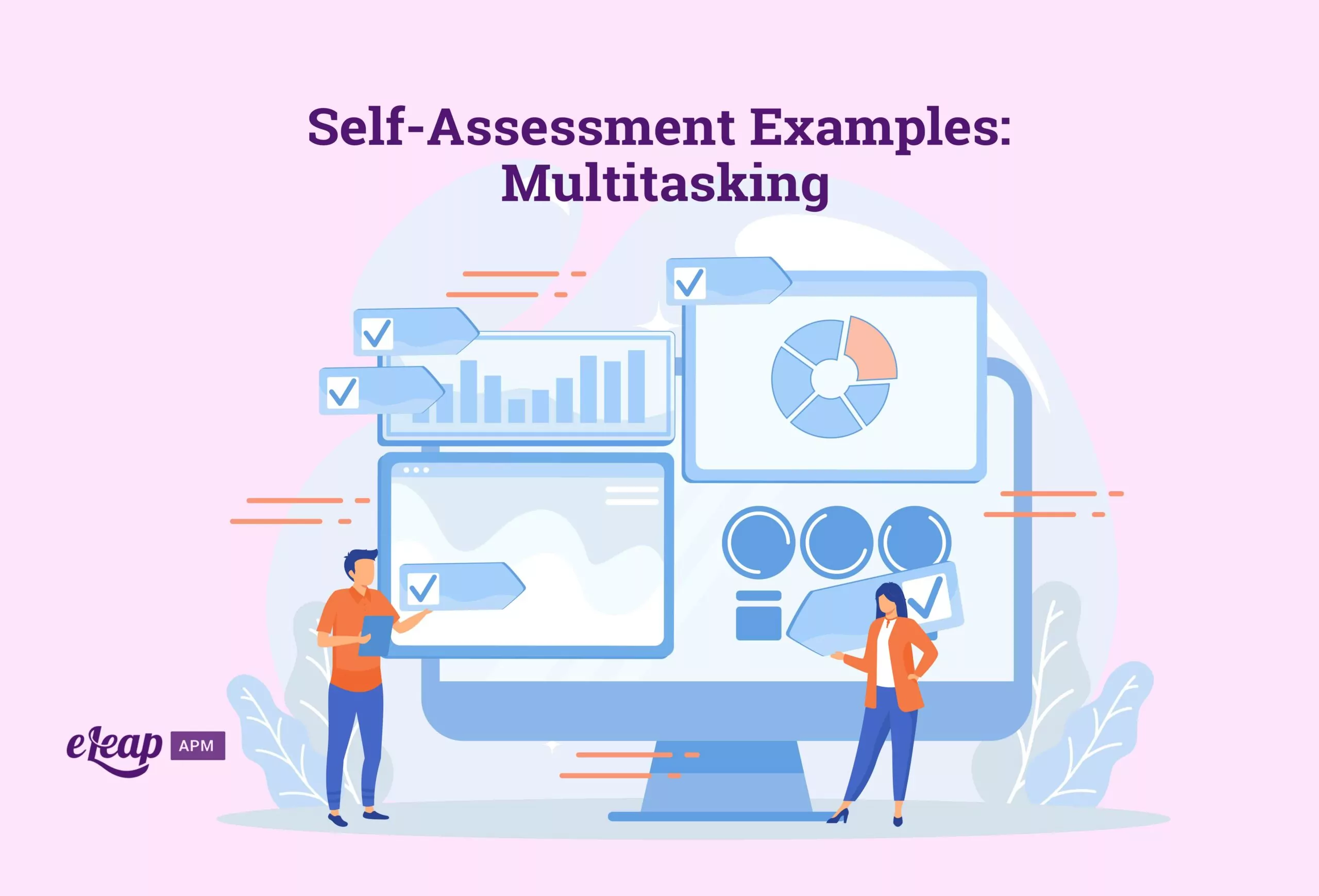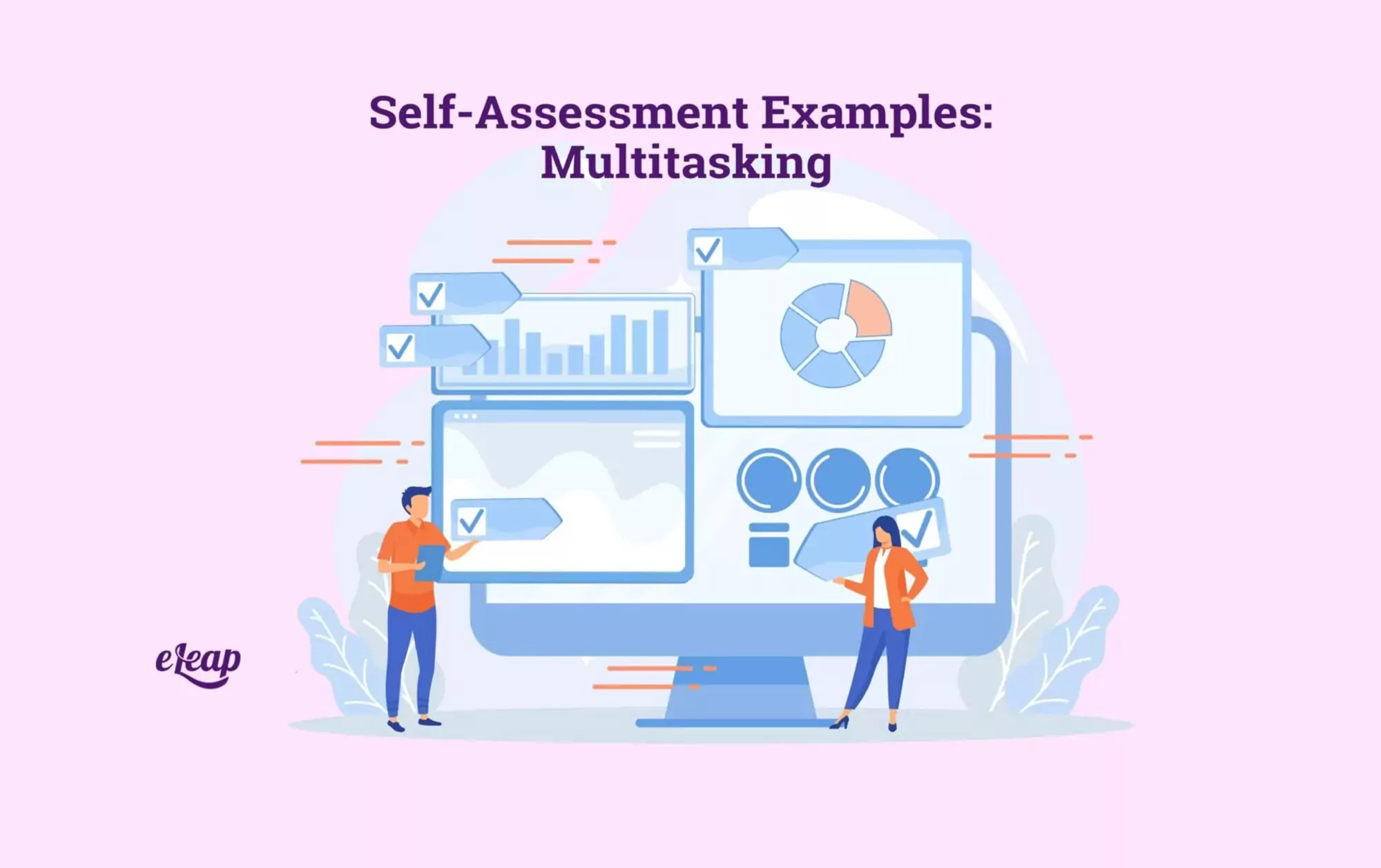Self-Assessment Examples: Multitasking

Multitasking is a skill that most people believe holds immense value, so much so that it is a frequent addition to the skills section of many resumes. Being a great multitasker summons images of people hard at work juggling conference calls, composing emails, and updating their social media accounts, all while sipping on a cup of coffee. Explore how eLeaP’s Performance Management Platform can simplify evaluations, boost productivity, and drive measurable results.
The term multitasking has cemented itself into the public consciousness as a skill necessary for success, both in our professions and personal lives. However, studies show that focusing on one task at a time through to completion is much more productive, efficient, and healthier for our minds and bodies.
In this article, we will outline why multitasking has taken a back seat in the public dialogue and discuss the science behind why being a single-tasker is much more beneficial.
What Does It Mean to Multitask?
Multitasking is when we perform more than one task at the same time. Humans have expanded the definition to include the ability to switch quickly between tasks or perform many tasks quickly and in succession. However, originally, the term “multitask” related directly to computers’ ability to perform several tasks concurrently. It wasn’t intended to be applied to human behavior.
Being a good multitasker has its place, and numerous professions require at least some level of competency in completing more than one task at a time (think air traffic controller). But the truth is, even when people believe they are multitasking, studies show that what they’re actually doing is task-switching.
Multitasking is not a new concept; many of us can remember trying to do homework while simultaneously taking on the phone, listening to music, and watching television. However, in today’s digital environment, the incoming information streams have only multiplied and become more complex.
With the likelihood of a constantly connected mobile device in our pockets dinging every time we get an update on social media or a computer or laptop always nearby chiming to notify us of incoming emails, it has become harder to focus on a single task for any length of time without interruption.
Researchers, psychologists, and neuroscientists have spent the last several decades studying the differences between multitasking versus single-tasking. Their conclusions are almost exclusively a consensus that while multitasking may be valuable in certain situations, people who focus directly on a single task without distraction perform better, are more productive, make fewer mistakes, and are better able to retain and apply pertinent information.
Let’s examine the reasons why multitasking might not be the best approach, especially for learning or job performance.

The Negative Consequences of Multitasking
-
Lowered Ability to Process and Retain Information
Researchers at Stanford University conducted studies on the ability to retain and recall information while multitasking. They found that people who utilized heavy media multitasking were less able to recall specific information and were less likely to differentiate between relevant and irrelevant information.
Our brains are not designed to process multiple streams of information simultaneously. Instead, we switch our attention and focus quickly on competing inputs. When this happens, and every time this happens, our brain must reset itself to match the parameters of the information.
Not only does this slow down our processing speed, but it can also mean that we lose focus on what’s important and what is not. This can make us less able to use and implement essential information after the fact.
-
A Higher Occurrence of Mistakes and Errors
Consider the rate of accidents among “distracted drivers.” According to the CDC, distracted driving increases the chance of being involved in a motor vehicle accident, and an average of nine people are killed every day by crashes as a result. It’s safe to say that anyone who has ever gotten behind the wheel has had a moment when they look down at the radio or glance at their phone before becoming suddenly aware that their attention is no longer on the road.
As an example of how the younger generation doesn’t benefit from the constant competing inputs they’re bombarded with daily, a higher percentage of younger drivers is responsible for those crashes. While some of that can be attributed to the fact that teenagers don’t have as much experience handling a vehicle, it should be noted that their supposed ability to multitask doesn’t seem to help them focus on the road when their cell phone rings.
Constantly switching focus between two competing tasks increases the risk of mistakes. While those switches happen and our brain is forced to reset distraction and error are inevitable.
-
It Impacts Your Memory and IQ
A study published in the Journal of Experimental Psychology: Human Perception and Performance found that multitasking can harm short-term memory. This is because when you are trying to focus on more than one task at a time, you have a lowered capacity to store memories for recall later.
Have you ever been reading a book or an email and made it through an entire paragraph before realizing that you don’t remember a word of what you just read because you were distracted by something? That’s because your brain is trying to focus on competing stimuli. While you may have read the words on the page, you couldn’t retain any of that information.
-
Multitasking Causes Anxiety and Stress
Multiple studies have concluded that people who confess to multitasking are more stressed and suffer from higher levels of anxiety than those who don’t. If you’ve ever tried to multitask yourself, maybe at home or the office, you might recognize this feeling as familiar.
Several studies have proven that multitasking can raise the heart rate and blood pressure and even deplete the brain’s energy stores. Every time you switch focus from one task to another, the body’s functioning changes physically, which can have long-lasting effects. Increased stress and anxiety can lead to negative health effects and can certainly lower a person’s quality of life.
-
Multitasking Reduces Productivity
So, how much productivity is lost when we think we’re making things better by attempting to perform several tasks simultaneously? The answer is alarming. According to research, it could be as much as 40%.
Because your brain isn’t designed to perform more than one task at a time, attempting to do so means it needs to constantly switch its attention. Every time that happens, precious time is lost. The more complex or demanding the task, the longer it takes for your brain to refocus.
Task switching seriously affects mental function. Scientists have pinpointed four areas of the brain that are triggered by this activity. It’s not a simple matter of flicking a switch. First, the brain must switch focus and attention by selecting which task to work on. Then, it needs to remember the rules and parameters for that specific task, monitor for errors, and prepare for the action of performing said task.
All these factors lead to major consequences: lost productivity and efficiency. So, we may think we’re getting ahead of the game by completing several tasks at once. What’s happening is that we’re overtaxing our mental capacities and losing precious time and accuracy as a result.
How To Be a Better Single-Tasker
What does all this mean for those of us who often find ourselves overwhelmed with tasks? Is multitasking completely useless in every scenario? Probably not. Many people may find themselves in situations where the ability to split our attention is beneficial and necessary. Parents raising children would be a fitting example.
But regarding our everyday lives, both personally and professionally, the fact is that we might find more success and happiness when we allow our brains to function the way they’re supposed to. And that means giving ourselves the time and allowance to focus on a single task before jumping to something else.
Here are five tips to help even the most practiced multitasker break unhealthy habits and retrain their brains to be more single-minded.
-
Minimize Outside Distractions
Giving complex tasks our undivided attention is key to performing them well. So, as tempting as it might be, silencing your mobile phone and delegating a separate time to respond to emails can go a long way toward helping you focus.
-
Set a Time Limit
Dictating a specific time limit for tasks can help maintain the attention we need to complete a task successfully. When you know the clock is ticking, you will be less likely to give in to potential distractions.
-
Take Frequent Breaks
Our brains need time to reset and refocus; whether we allow that time or not, our brains will take it. So once a task has been completed, allow for a moment of rest before jumping to the next thing. Your brain will thank you.
-
Get Creative Early
Our brains tend to be more refreshed, rested, and receptive during the early part of the day. So, use that time to tackle tasks that require creativity and big thinking. Leave repetitive or monotonous tasks for the latter part of the workday.
-
Give Yourself Some Credit
There’s no denying that being a human being is challenging work. Focusing on success and performance at work or school. And then managing crucial life responsibilities during our downtime can be taxing at best and exhausting at worst. Make sure you give yourself space to relax, socialize with family or friends, and make the most of your time. And don’t forget to pat yourself on the back for a well-done job.
Conclusion
Multitasking is one of those phrases that has become synonymous with the capability to go beyond the norm. However, it’s not as beneficial for us as we once thought. Overall, multitasking can cause stress, anxiety, and poor health. And it isn’t effective in terms of performance, memory, or information recall either.
Instead, we need to retrain our brains to behave how they’re supposed to. Giving individual tasks our undivided attention whenever possible. Doing so will benefit us professionally and personally, leading to better health and well-being. And what could be bad about that?